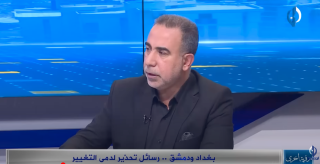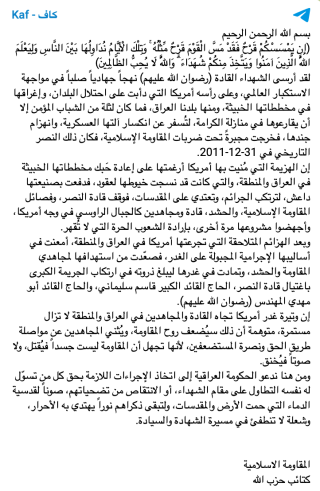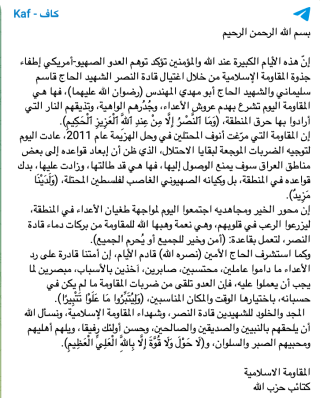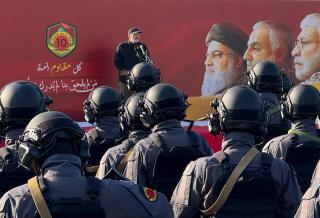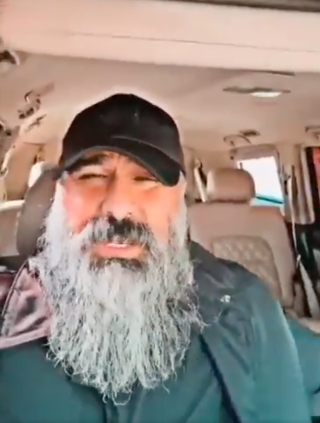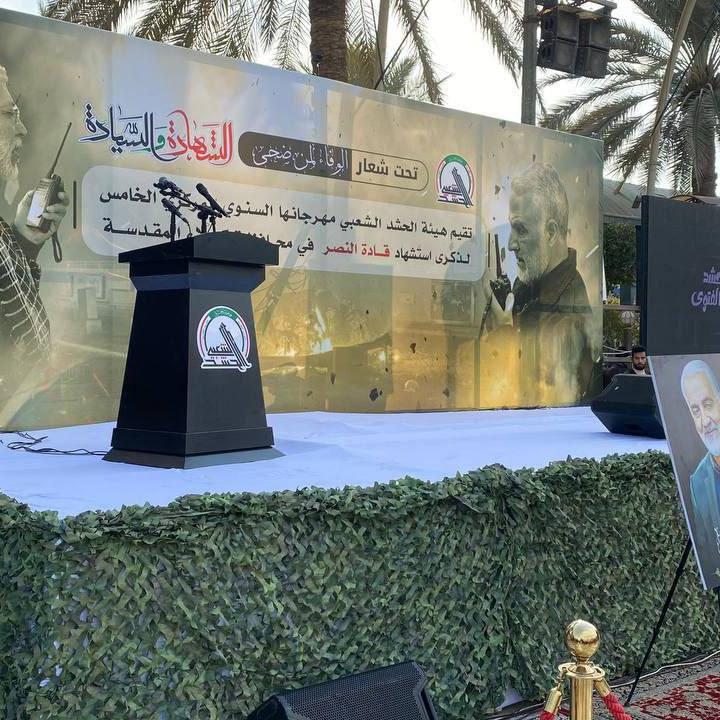
Iraqi Militias Too Scared to Fully Commemorate Soleimani and Muhandis

In the shadow of Trump's imminent inauguration, Iran-backed terrorist groups were cautious in how they commemorated the anniversary of the January 2020 killings.
Amid serious setbacks to the so-called "axis of resistance" in the Middle East, Iraqi muqawama (resistance) militias have seemingly shifted to a less aggressive narrative. For instance, prolific muqawama commentator Ali Fadlallah declared on al-Janoub TV—owned by Saraya al-Jihad, the 14th Brigade of the Popular Mobilization Forces (PMF)—that he prefers "to see U.S. forces stay in Iraq...If the Americans leave...they will put political and international pressures on you. Currently they are being kind to you and trying to protect you, not because they like you, but because their interests demand it” (Figure 1).
Fadlallah is not a militia badge holder per se, but he belongs to a group of commentators who serve as surrogates for the militias, amplifying their talking points. His remarks suggest that at least some of the muqawama prefer the United States to remain in Iraq to "protect" them.
KH Treads Carefully
The change in tone is also evident in recent formal statements from the militias themselves, which lack their usual threatening language. On January 3, the anniversary of the U.S. targeted killing of Iranian general Qasem Soleimani and Kataib Hezbollah founder Abu Mahdi al-Muhandis, KH issued a meek statement that lacked any threats or escalatory language. Instead, it called on the Iraqi government “to take the necessary measures against anyone who dares to insult the status of the martyrs or undermine their sacrifices” (Figure 2).
Compare this to KH’s January 2024 statement commemorating Soleimani and Muhandis, which featured much fierier rhetoric: “Today, the muqawama is beginning to demolish the enemies’ thrones and their fragile walls, making them taste the fire they intended to unleash on the region...The muqawama has returned today to deliver painful blows to the remnants of the occupation, who believed that relocating their bases to certain areas of Iraq would shield them from harm” (Figure 3).
KSS Also Tones Down the Threats
Similarly, a January 4 speech by Abu Ala al-Walai, leader of Kataib Sayyid al-Shuhada (KSS), lacked his typical escalatory rhetoric: “The situation in the region requires us to be prepared, take precautions, and remain vigilant while continuing to monitor events closely” (Figure 4).
This contrasts sharply with his remarks in December 2021, when he announced a plan to recruit thousands of fighters in preparation for “the hour of determination and the big battle,” specifying a “decisive and historic confrontation with the American occupation on 12/31/2021." At the time, muqawama media were saturated with discussions about expelling U.S. forces by the anniversary of Muhandis and Soleimani's deaths the following month.
Nujaba Says It Best by Saying Nothing at All
Curiously, Harakat Hezbollah al-Nujaba (HaN) refrained from issuing any statements to commemorate the anniversary. This unusual decision appears to stem from HaN's reluctance to issue a statement with soft language. By simply saying nothing, HaN did not antagonize the Americans (which Iran and other muqawama players likely discouraged the group from doing), but also did not signal fear with a cautious statement. Their silence is presumably intended to signal simmering ill will.
The muqawama militias are apparently convinced that they will come under attack in the near term and are eager to avoid exacerbating the situation, particularly in light of Trump's imminent return. This concern was explicitly voiced by Abu Azrael, a commander with Kataib al-Imam Ali, during one of his characteristic live rants, when he stated, “We and our leaders will be subject to assassinations” (Figure 5).
In this Iraqi election year, the muqawama may soon turn their efforts squarely onto domestic political threats. These are the kinds of targets the muqawama like the best: ones that (mostly) don't shoot back, such as unarmed civil society campaigners and media figures. When the militias do resume attacking such people in earnest, these crimes should be energetically exposed. One can expect the muqawama to begin a huddling-together process ahead of the elections, shepherded by Iran's Islamic Revolutionary Guard Corps-Qods Force into a slightly more cohesive group. Militia leaders may be easy to drive into hiding (often in Iran) whenever Israel or the United States appear on the verge of targeting them.

